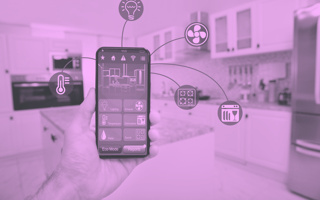
From video doorbells to smart locks to Bluetooth-enabled thermostats, smart home systems can be incredibly beneficial for homeowners. They can make tasks simpler and help you run your home more efficiently. There are a few things homeowners should know before installing one, however.
To help you prepare for this investment, 13 members of the Young Entrepreneur Council discuss what they believe all consumers should know before purchasing a smart home system. Keep these insights in mind as you’re shopping for your next device.
13 Things Every Consumer Should Know Before Buying a Smart Home System
- You’ll have to figure out how they’ll work with each other.
- You can’t depend on them completely.
- There will be a learning curve.
- They can impact your privacy.
- The device should have a strong security system.
- You want to make sure everything is compatible.
- Smart home systems aren’t perfect.
- There are trade-offs in choosing one system over another.
- You’ll want to check your battery options.
- The system is always listening.
- You don’t have to buy everything at once.
- You should consider the system features you want.
- You should look into how you can control your personal data.
1. You’ll Have to Figure Out How They’ll Work With Each Other
It’s important to figure out ahead of time how all your devices will work with each other. Can you manage them all through one app or will you be dealing with 10 different apps? Whether you’re buying a smart speaker, a smart vacuum or something else, identify how all of your devices can potentially work together to save you time. —Maria Thimothy, OneIMS
2. You Can’t Depend on Them Completely
You can’t depend entirely on these smart devices. Sometimes, you might find yourself in a helpless situation due to technical glitches that come up unannounced. Prepare yourself for such occurrences. —Josh Kohlbach, Wholesale Suite
3. There Will Be a Learning Curve
Smart home technology is an amazing resource and can be used to increase efficiency and security for most homes, but there is a learning curve to all smart home devices. The key to embracing and thriving in a smart home environment is to take the time to learn the system and allow the system to learn your home. Managing expectations is so important. —Ryan Bradley, Koester & Bradley, LLP / White River Consulting, LLC
4. They Can Impact Your Privacy
I wouldn’t necessarily say that smart home systems will expose your personal information, but they can have an effect on your privacy and sensitive data (like your movement, buying patterns, credit card details and more) and are made available to marketers to increase their level of targeting. Consider these functions of smart systems before buying them. —Kelly Richardson, Infobrandz
5. The Device Should Have a Strong Security System
It is important that each device’s security system doesn’t present errors or failures that allow them to be violated. In addition, they must have an excellent communication protocol and good technological capacity. —Kevin Leyes, Leyes Media & VVS, by Leyes Empire
6. You Want to Make Sure Everything Is Compatible
One of the easiest things to forget is to make sure all of your new devices are compatible. While it’s nice to have a smart doorbell, security camera and thermostat, it’s difficult to navigate them all if they answer to different ecosystems. What can make things even worse is buying something that isn’t compatible with your phone! Before making any purchases, be sure all your devices are in sync. —Matt Bertram, EWR Digital
7. Smart Home Systems Aren’t Perfect
The thing you should know about smart homes is they are still far from perfect. You should expect to run into several glitches along the way. The key to improving these systems is to take the data from these errors and apply it to the system. Make sure your smart home provider has a way for you to send bug reports so they can gradually improve their product over time. —John Turner, SeedProd LLC
8. There Are Trade-Offs to Choosing One System Over Another
I think that there will be trade-offs when you pick one smart home system over another. For instance, people who aren’t used to Apple’s software can find it frustrating to use Apple HomePods and similar devices. Look at what you use currently and work with the same brand or operating system for a more seamless experience. —Blair Williams, MemberPress
9. You’ll Want to Check Your Battery Options
Check battery options, either through rechargeable cells or standard batteries. A short power outage can cause a significant delay while the device reconnects, so battery back-up is important. If you like everything about a particular hub but it just happens to lack a battery back-up option, consider purchasing an uninterruptible power supply to plug it into. —Daisy Jing, Banish
10. The System Is Always Listening
You are being listened to. The system's “ears” don’t turn on when you call the device’s name — rather, it’s always listening. If you are someone who’s concerned about privacy or your shared data, smart home systems may not be for you. —Zach Binder, Bell + Ivy
11. You Don’t Have to Buy Everything at Once
You don’t have to purchase a comprehensive system all at once. Most of the time, you can start off with a basic package and add in more features and products as the need arises. This allows you to spread out the overall cost, which can be a significant factor depending on the system you choose. —Andrew Schrage, Money Crashers Personal Finance
12. You Should Consider the System Features You Want
When purchasing a smart home system, consider if it has the main features that you’re looking for. What do you want to use your system for? Is it to regulate the temperature, turn lights on and off, add security or something else? You may want all of these features and, if so, you have to do your research to determine the best fit for your home. —Jared Atchison, WPForms
13. You Should Look Into How You Can Control Your Personal Data
Security is a major concern for many people. You should know that devices are listening to you to pick up voice commands. If you’re someone who values privacy, then you should look into how you can control your data and do your due diligence. Smart home systems are not for everyone, and you should talk to the business about privacy concerns before you buy a smart home device. —Syed Balkhi, WPBeginner





